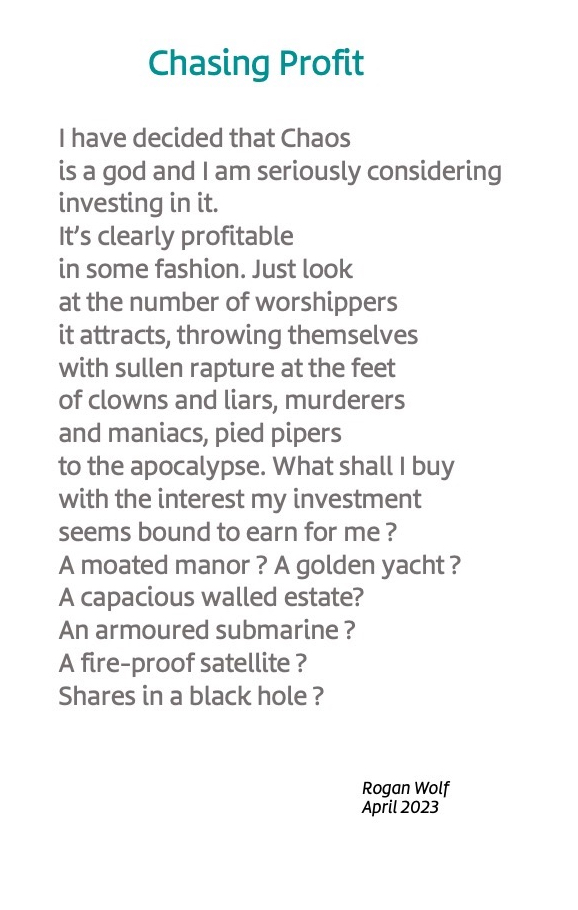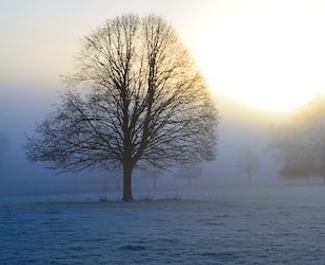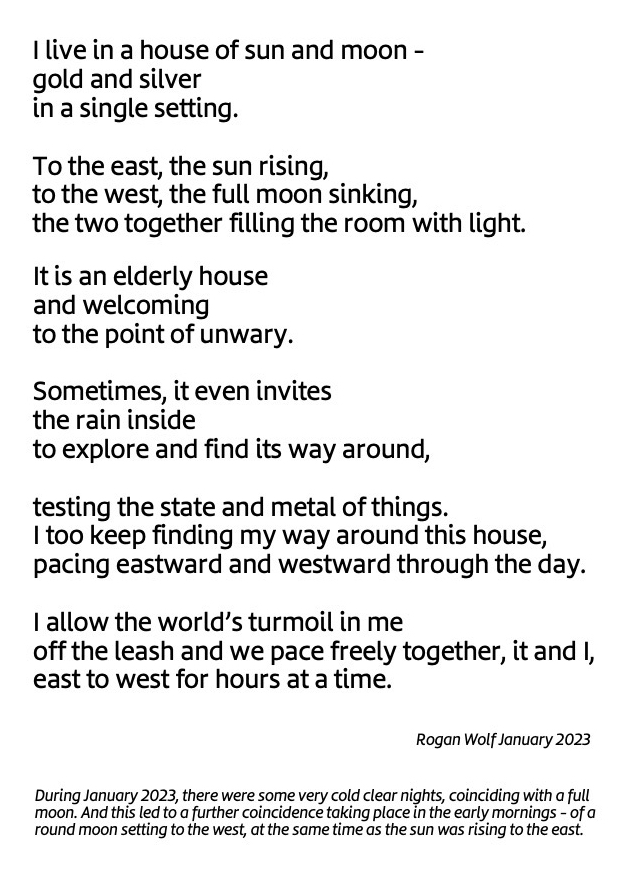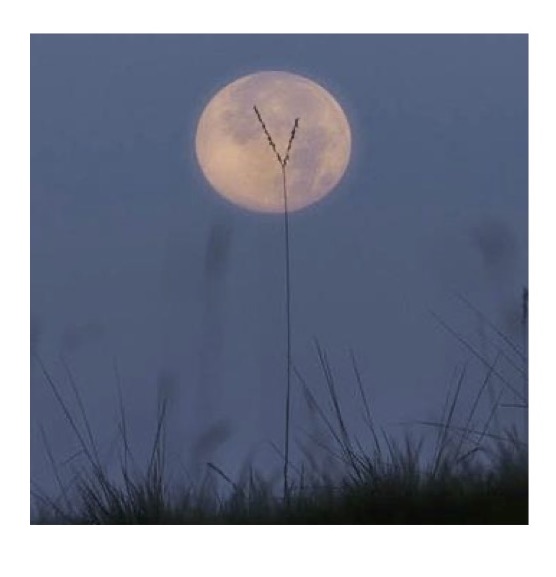
In all our sanctuaries we sit at risk
-
Posted:
-
-
Moles Poem

Moles
I must keep a close watch on the mole-hills clustered around the fences of my house. I feel sure there'll come a time when moles will emerge from those surprisingly massive eruptions of earth they've created - and each will be carrying binoculars and waving a flag. And the flags will not be white ones. And the binoculars will all be turned in my directions and the flags will have my name on them. 'There he blows !' the moles will cry. 'Charge !' And all the moles will vanish underground again and new mole-hills will start appearing in straight lines and these will advance at greater and greater speed, each mole-hill like a puff of loamy smoke or a further dark stitch across the ground : and all in the direction of me - my frontiers my barricades my walls my foundations... I have no answer or solution to this hovering multitude of moles. It's as if I'm hanging helpless here in my house like a fly already trussed up in a cobweb just waiting for them to arrive. They are free to molest me at will and at leisure - child's play mole-prey.
Rogan Wolf

Posted:
-
Truth cf. ‘Impartiality’

This is being written a few days after Gary Lineker refused to back down. He won’t read these words, but I feel the need to declare here to whoever might be visiting my deep admiration and gratitude for the position Lineker has taken and held, both on a disgraceful and abhorrent government policy (and the motives for, and the framing of, that policy), and on the attempts to close him down that have followed.
Will Hutton’s majestic piece on the topic in the latest issue of The Observer, leaves me with little to add. Over to his conclusion : ‘Now Labour cannot allow only Gary Lineker to speak about the rotten values that have driven the [asylum-seekers policy], as the numbers declaring their support for him grow. This is transmuting into a popular progressive movement as the integrity of public service broadcasting is defended alongside Lineker’s stance on asylum. Britain is not the rightwing country the right imagines. It is a fairer, much more decent place. Congratulations to the Match of the Day presentation team who showed us who we are – the best game any of them have played.’ And here is a link to the whole article : https://www.theguardian.com/…/its-taken-brave-football…
Then, to my surprise, an article published in today’s Guardian reminds that there is something to add, after all. It is by John Kampfner and here it is. Kampfner gets closer in to what goes on along the interface between the forces of the political executive and those of public witness and he is quite scathing concerning the conduct of successive BBC senior managers. They have a crucial duty to perform and all too often fail to perform it.
And this leads to the thought that ‘impartiality’ is perhaps an unhelpful word and criterion by which to judge the BBC’s role in our society. The word merges blearily into something about ‘fairness’ or ‘balance’ – creating an ‘equal’ treatment and recognition of opposing interests, without ever looking carefully or properly, from first principles, at what those competing interests might be.
A great number of unscrupulous and unworthy individuals and groupings in modern society have every interest in deceiving, covering up, distorting, selling, self-promoting. They threaten the integrity of all language. They threaten what makes Democracy worth defending. In the face of these forces, truthfulness is the only valid measure and authority, ‘impartiality’ a mere gift to the unclean and the malign. All too easily, it gives the Lie equal and balanced standing as the Truth, thereby and instantly offering space and credence to the Lie, when all the Lie deserves is contempt and rejection. The Lie is to be unmasked, expelled. It is Democracy’s enemy. It is The People’s enemy.
The BBC’s proper role is to report truthfully on what is happening, without fear or favour. Not to please all parties. Not to pull its punches for fear of annoying the Party in power. Or the Sun. Or the Mail. Or the Express. Or the Telegraph. Not to give space and coverage to the liars and twisters of truth, allowed footing on a par with those who report on ‘things as they are.’
The BBC is (or has been) respected the world over for being reliable as witness to the truth. Not just another creature of the Lie, under cover of ‘impartiality.’
Posted:
-
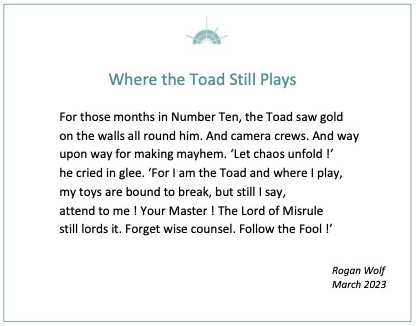
Here is another of those Rhyme Royal stanzas. Mr Toad of Toad Hall is, of course, a character in Wind in the Willows, that famous Edwardian children’s story by Kenneth Grahame. Any suggestion that Alex Johnson, our disgraced and disgraceful recent Prime Minister, might remind me of Mr Toad, or that this Rhyme Royal recurrence might be the result of our nation’s nightmare tyrant-child’s provocative attempt to grab a perch in the House of Lords for his Dadsy, would be an outrage. I might sue !
Posted:
-
Putin’s Mind
It is hard to put yourself in Putin’s mind. But how hard ? Is it impossible ? Maybe not.
He looks out at the world and is much concerned with maintaining control and his own footing and security there. Consequently, he has always been pre-occupied with strengthening and extending borders, creating safe distance between him and Other ; and he thinks and talks quite a lot about his own racial and national identity and history, his place in it, his belonging, his base. And so on.
It can be argued that Putin’s invasion of Ukraine is a particularly extreme and murderous version of similar tendencies and behaviours elsewhere in the world, in these tumultuous times. What about the fantastical and nostalgic joys of ‘sovereignty’ and an expectation of (and psychological need for) ‘world-beating’ UK achievement, post Brexit ? And Trump’s ‘Build that Wall’ to protect gun-toting Americans from all sorts of dangerous foreign bodies ? This ‘We’ safe in here, huddled in Delusion-land ; and that ‘They’ held at bay out there – not human beings in need and with something to give – on the contrary, just dehumanised threat.
What is the psychological implication, for instance, of the UK’s replacement of descriptive titles such as ‘Customs’ and ‘Immigration Control’ etc by the emotive term ‘Border Force’ ?
Surely some of the strongest ‘feelings’ associated with the present time are anxiety, confusion and uncertainty, amid ever more rapid change. In such a time, an emphasis on Borders and Force and the creation of separateness, is psychologically unsurprising, perhaps. But at least in a democracy, however flawed and unfit it has become, the Brexiters can at length be challenged or unseated or discredited, having revealed their vacuous delinquency and incompetence, in the damage they have done.
By contrast, Putin is a pretty effective, but also a vastly isolated, tyrant. He is still able to ensure that people fall out of windows if they criticise/question him. Therefore, the ambitious courtiers around him are careful to butter him up and not challenge. On the contrary, they help to confirm him in his ideas/delusions and therefore his sense of omnipotence, his lone status and infallibility. So his fantasies and fears, projections and delusions have no firm reality to brush up against or be grounded by.
And he is 70. And he controls everything in his vast country but he doesn’t seem able to control time and aging. Time and age are invading his own personal borders, despite the yacht, despite the palace. His borders are giving way. Nonsense, he would say. His borders giving way ? He simply won’t let them. On the contrary, he is extending his borders with unstoppable force. In doing so, he is extending himself, his range, his span, his very life span. Surrounded on all sides by death, the deaths of Ukrainians and the deaths of Russians, he himself will live on and on. Russia/Putin will consume the enemy. Russia/Putin will grow and grow. He is Putin the Great.
Cut to Earl’s Court in south west London, in the Royal Borough of Kensington and Chelsea. Behind the Earl’s Court Road itself, is a mass of flats and bed-sits. The area was famous, once, for being a kind of stop-over for travelling young ‘Aussies.’ But behind the scenes, the Earl’s Court ‘community’ was always a lot more complex than that. For years, it was a destination for people of many nationalities, many of them refugees and exiles from regions of conflict elsewhere. (The UK was once rather more welcoming and open to the stranger than it is at present). About twenty years ago, the local Social Services Department calculated that 65 nationalities were represented in the population living in the Earl’s Court area, a significant proportion of them elderly.
I used to work for the care services and once conducted a project in this same area. The project involved piloting a record to be left in the homes of lone elderly people living in the area, many of them quite confused and frequently visited by a wide range of different professionals, such as home help and district nurse and social worker. Let each visitor write something brief in this record, to keep all the other helpers up to date and in sync. The pilot went well and proved the worth of the idea and the design.
In the process of doing this work, I got to know not only a number of the local inhabitants, but also of their visitors, including various home helps, the value and importance of which occupation particularly impressed me. Let this poem continue the story :
It may be different now, but our low-paid
Home Helps did much for a while
to keep this nation civilised
and years ago, I talked to one who worked
among these flats, a young woman
who said she was assigned each morning
to attend a White Russian princess.
But before she could gain entry
she had to force her way
through a small dark vestibule
always piled to the ceiling with chairs.
For the aging princess had spent most of the night
stacking them up as a barricade
against malign intruders
with supernatural powers,
she knew were swarming
all around her tiny home.
She would not have slept very much.
Once the young home help
had forced an entry, the princess
would always greet her with arms
wide open, grateful for rescue.
Every night, the old princess was alone with her tormentors. Every morning the home help rescued her, as if for the first time.
And this is not an uncommon story. It was as if the walls of the princess’ flat became porous when she was alone. And those hostile forces came through the walls entirely at will, stealing precious belongings, lifelong companions, links to her past. They were projections of threat, of the loss of adult powers and grasp, unresolved hurts and fears. They were harbingers of death itself.
So the princess spent all and every night awake and haunted, seeking to strengthen her barricades to keep the Hostile Force at bay. Whatever It was and whoever They were. All her fears. Death itself. The sense of something coming for her, depleting her.
Putin’s invasion of Ukraine is surely rather similar, in some dreadful sense, to that old refugee princess, stuffing her hall with chairs all night, lost in nightmare. She at least wasn’t killing people in order to keep the enemy at bay. For her it was piles of chairs, not piles of bodies and shattered apartment blocks.
But this leads to another thought. Like the old princess, in her small flat in Earl’s Court, Putin is surrounded by Death, but I do believe that, unlike her, he won’t accept that it is reaching for him too. He is sure he is different. Everything that has happened in his life has told him so.
Death is the autocrat’s tool and weapon. And distance and Borders and the deaths of others are what keep the autocrat safe and feeling always different. Death is what happens to others, says the autocrat ; and it is I who wield death.
The autocrat must hold power and have control. The autocrat’s own death is unthinkable because it is not his to control. Therefore he will not die.
So, for a while longer, I believe we are safe from any real prospect of Putin resorting to nuclear weapons. This does not mean that he would hesitate for one moment from killing millions at a stroke, if that would suit his purposes. But the prospect of being killed in the retaliation that would follow, still deters him. For remember, Putin doesn’t do dying, only killing.
But what if, one day, Putin finally accepts that there’s no escape ? That he cannot detach himself from his own mortality ? From the years as they pass and as his manifest decrepitude increases ? The failures as they pile up and leave him isolated and without cover ?
In those moments of realisation, all of humanity will be at risk. All borders could burn. All futures could evaporate.
For if Putin comes to realise he has to die, then what motivation will he have to allow others to outlive him ?
And, in those moments of Putin’s realisation, it is indeed all people everywhere who will be at risk of annihilation – not just those millions of mortal beings living outside the Putin borders, but the millions living within them too, his ‘own’ people, the old and the young.
Posted:
-
-
Poems for the Wall
I haven’t mentioned this project here for a while.
I started it over twenty years ago, now. Both of the following two statements are true : it remains what it has always been – very much a one-man-band ; but also, and from the beginning, it has received help and support from a wide range of individuals, each excited by the idea of helping poetry reach beyond its usual range – the specialist book shelf, the preserve of the few. I submit that poetry belongs where all of us go and any life uninformed by decent poetry is an impoverished life. Truth is the truer for decent poetry. In fact, we need it to help us properly to see and appreciate the truth.
I am going to bring together a few links here. The first one is also displayed onscreen here, just below :
1/
A recent information sheet on the project as a whole.
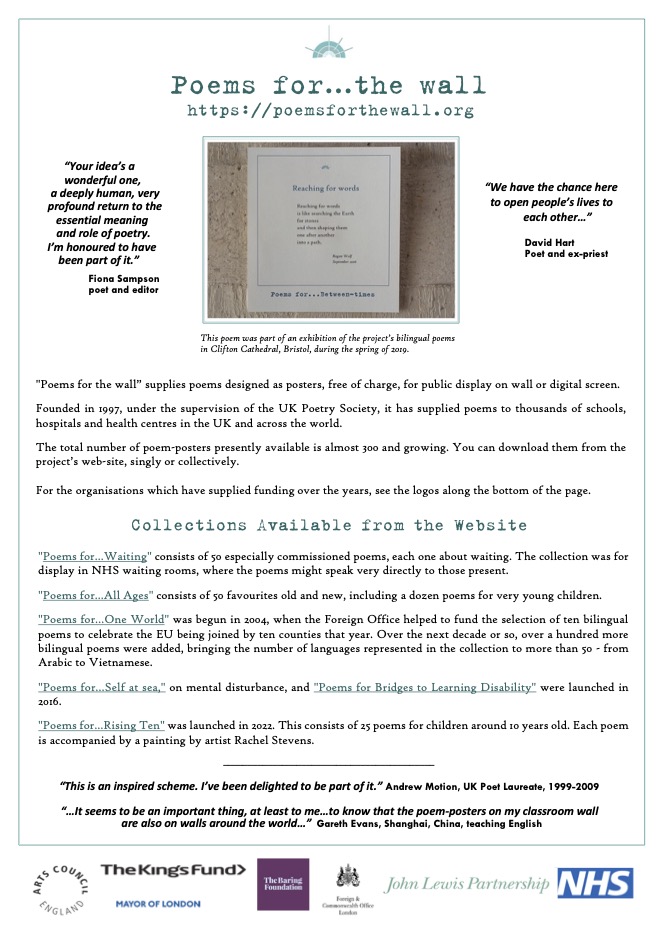
2/
Pictures of an exhibition of the bilingual poems held in Clifton Cathedral about three years ago.
3/
Pictures of an exhibition (in a quiet village church) of the project’s latest collection. This one is for children and is called “Poems for Rising Ten.” It is rather beautifully illustrated, thanks to the artist Rachel Stevens. Rachel made her work available, free of charge.
More and more, I am thinking that in each case, the combination of the text and the art work come to more than just illustrated words. They make a statement together that is more than each.
I am also wondering now to what extent this is, after all, just a children’s collection. Certainly, it was chosen for them and I hope will find its way to plenty of them. Yet the exhibition proved quite popular with all ages, in that ancient place of assembly, where people have worshipped through the centuries. I am told a few tears were shed at different times, in response to this poem or that, and they weren’t children’s tears.
Posted:

